Croatia Filming Locations Are Best Again As Succession Bags 7 Emmys
September 23, 2020 – Following incredible success with Game Of Thrones, Mamma Mia and others, Croatia filming locations prove to be the best again as HBO's Succession wins 7 Emmys
Historic Dubrovnik was always pretty enough to attract people from far and wide. Dubrovnik has a lot of sights to visit. In addition, it offers many activities such as hiking, cycling, sailing, boat ride, Seabob experience etc. But, following its appearance in TV show Game Of Thrones, interest in visiting the walled city went through the roof. Tourists were not the only ones who wanted to come.
HBO drama Succession is just the latest hit to take advantage of the spectacular scenery while filming in Croatia. The show has just bagged no less than seven prestigious Emmy awards for the season partially filmed in Croatia. In the drama series category, it picked up Emmys for Best Leading Male Role, Best Guest Role, Best Casting, Best Directing, Best Screenplay and Best Picture Editing.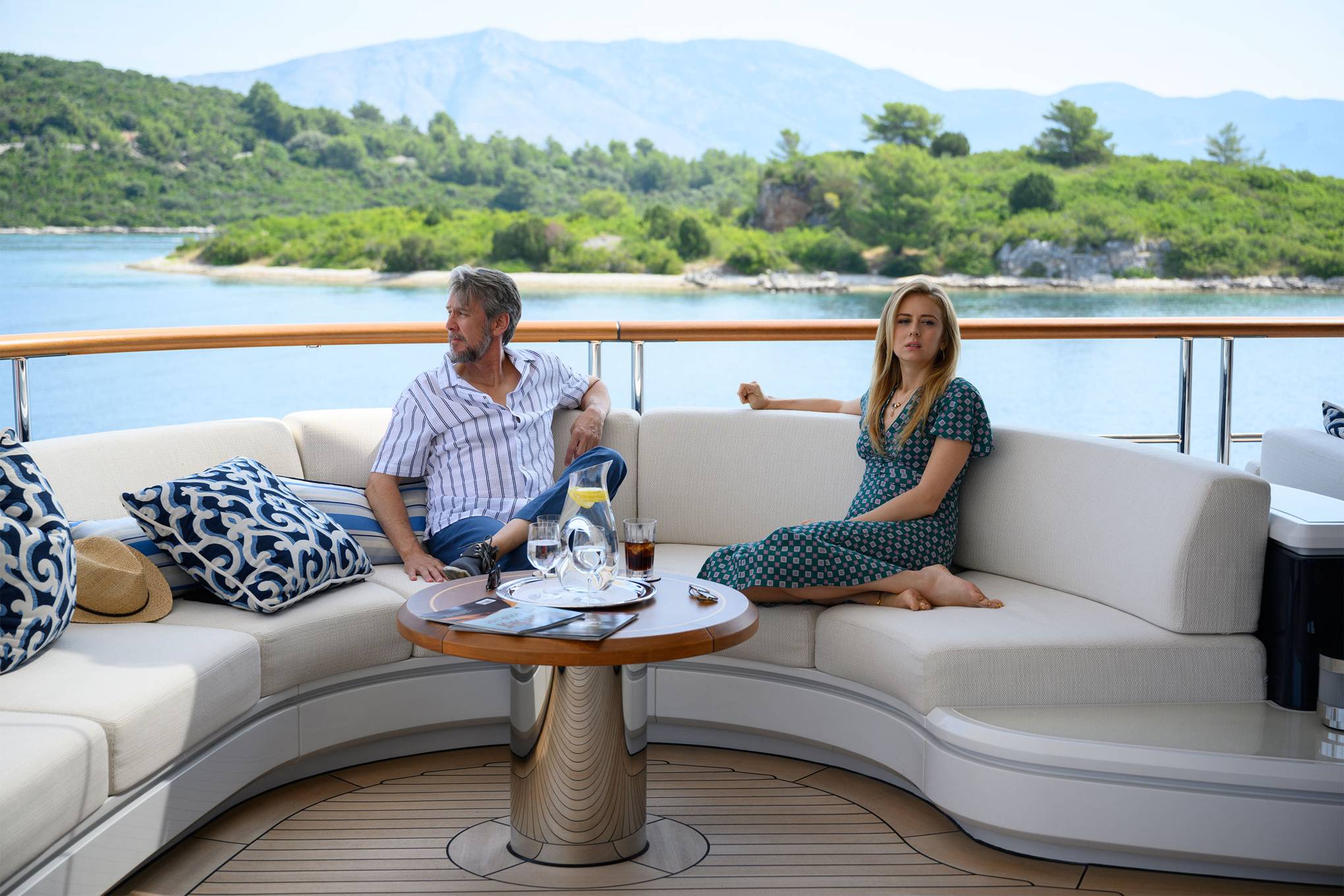 Cast members filmed aboard a yacht with beautiful Croatia and its Adriatic waters as the backdrop © HBO
Cast members filmed aboard a yacht with beautiful Croatia and its Adriatic waters as the backdrop © HBO
The shooting took place over 12 days in July 2019, primarily on a yacht on which the show's central characters, the Roy family, were taking a holiday. The Croatia filming locations used were the waters around Cavtat, Korcula, Mljet and Sipan. The series ventured into more urban areas of Croatia and, for those scenes, filming locations in Zagreb and Rijeka were sourced. The German-built Solandge was the yacht used in the filming and costs as much as $1.1million (£850,000) to rent for one week.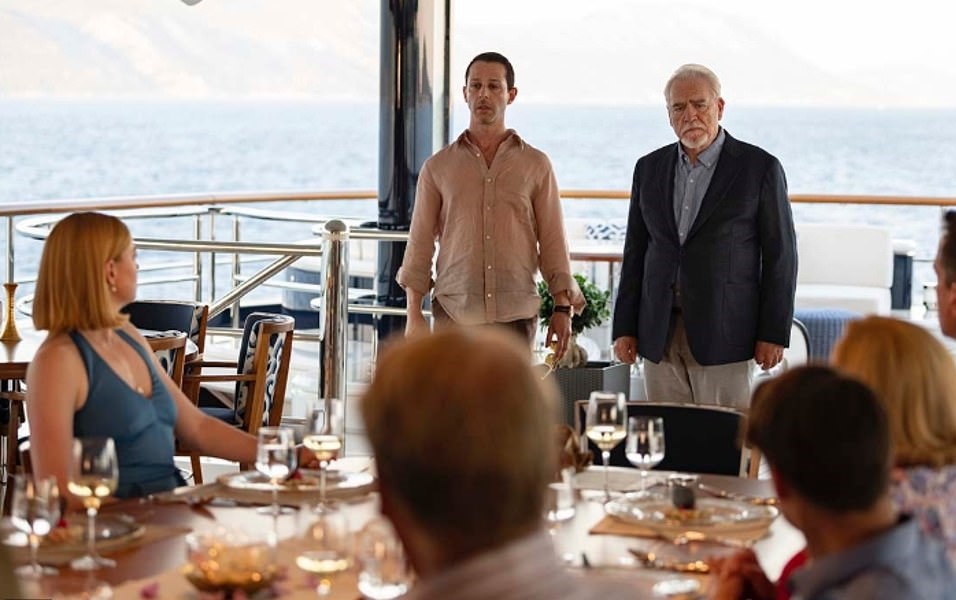 The Roy family aboard the yacht Solandge in Croatian waters © HBO
The Roy family aboard the yacht Solandge in Croatian waters © HBO
Now in its third season, Succession centres on the dysfunctional Roy family, owners of a global media and hospitality empire. It stars British actor Brian Cox as the ailing family patriarch with Kieran Culkin heading up the otherwise all-American cast. A total of 613 people worked on the shooting of Succession in Croatia, of which 595 were Croatian (161 film workers, three trainees and 431 extras).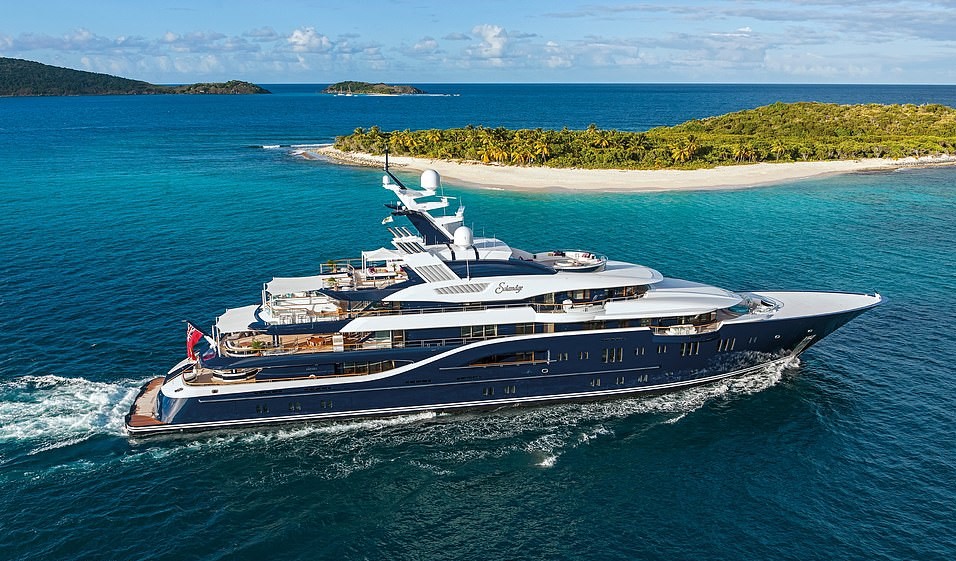 Solandge is currently one of the most luxurious yachts in the world © Moran Yachts
Solandge is currently one of the most luxurious yachts in the world © Moran Yachts
In recent years, major movies such as Star Wars, Robin Hood and one installment in the long-running James Bond series have joined the likes of Game Of Thrones and Mamma Mia in enjoying Croatia filming locations. However, filming in Croatia goes back much further than that. During the 1970s and early 1980s, no less than three Oscar-winning movies used Croatia filming locations - Fiddler on the Roof (1971), The Tin Drum (1979) and Sophie’s Choice (1982).
You can read more about filming in Croatia and Croatian filming locations by reading our dedicated section here
For the latest travel info, bookmark our main travel info article, which is updated daily.
Read the Croatian Travel Update in your language - now available in 24 languages
Join the Total Croatia Travel INFO Viber community.
Restaurant and Bar Owners in Istria and Kvarner Call for Aid to Survive
ZAGREB, September 10, 2020 - Over 600 restaurant and bar owners in Kvarner and Istria today closed their facilities for an hour, starting from 11.55 am, to warn about the difficulties they are facing due to epidemiological restrictions and to ask for assistance in order to survive until the next season.
The association of Kvarner and Istria restaurant and cafe owners, which initiated the campaign held under the slogan "Let us close today to stay open tomorrow", said that the campaign was successful. The goal was to encourage responsible institutions to urgently take action to preserve jobs in the sector and prevent its collapse.
The head of the above-mentioned association and the deputy head of the national association of restaurant and cafe owners, Vedran Jakominic, said that stakeholders in the hospitality sector were calling for a preferential VAT rate on food and beverages. He also said that they were having difficulties in obtaining loans and that it was necessary to provide stakeholders in the hospitality sector with access to liquidity loans.
"Let us work, pay employees, rents, fees and taxes because s scorched earth can bear no fruit. We believe that you are doing what you think is right, but let the profession tell you that you have made a mistake," Jakominic said.
He pointed out that job-retention measures had saved workers in restaurants and cafes from lay-offs but that they had not saved entrepreneurs.
He said that a survey had shown that 60% of stakeholders in the hospitality sector had seen a drop in business of over 50% and 40% estimated that they would not survive until the next season in the current conditions. About 80% will have to cancel employment contracts, said Jakominic, who noted that there could be about 20,000 lay-offs in the hospitality sector.
For the latest travel info, bookmark our main travel info article, which is updated daily.
Read the Croatian Travel Update in your language - now available in 24 languages
Kvarner and Istria Residents Appeal to Slovenian Government to Change Entry Measures
September 8, 2020 - Kvarner and Istria residents sent a public appeal to the Slovenian Government to change the entry measures of Slovene and other citizens coming from Croatia.
HRTurizam reports that in their appeal, they believe that the classification of the whole of Croatia in the red zone is not correct or justified, especially the inclusion of the Kvarner and Istria regions, since they recorded low numbers of infections for the duration of the COVID-19 pandemic:
"In these regions, the prescribed anti-epidemiological measures are being conscientiously implemented; people are responsible and disciplined. That’s why we all feel safe here. Kvarner and Istria border directly with the Republic of Slovenia; the people who live here are firmly connected on both sides of the border. Families live in our two countries, and people travel to work across the border every day. Traffic to Slovenia from inhabitants of Kvarner and Istria is intensive due to the purchase of various goods and the use of various services, as is the traffic of the inhabitants of Slovenia to Kvarner and Istria for the same reasons. Joint EU projects from various spheres of interest are also being implemented in this area. Slovenes have their own houses and boats in Kvarner and Istria, and together with friends from Croatia, they go fishing, sailing, and maintain real estate and movables.
We socialize and cooperate in a way that preserves our health, but also our good relations. Please consider the possibility of monitoring and classifying the Kvarner and Istria regions separately, regardless of the situation in the whole of Croatia. Visits to Kvarner and Istria can be checked in the eVisitor registration system and via the mobile application "Stop COVID -19".
Finally, we are aware of the dangers of conscientious and responsible people who adhere to mandatory anti-epidemiological measures. All this is confirmed by the positive COVID-19 results in Kvarner and Istria and the transmission of the virus on both sides of the border. We believe that there is no valid reason for Kvarner and Istria to be classified in the red zone for COVID-19 infection,” appealed the residents of Kvarner and Istria.
Finally, they conclude that omitting Istria and Kvarner from mandatory measures related to high-risk areas will help its citizens, friends connected with Kvarner and Istria, and add a new wind to better relations between Slovenia and Croatia now and in the future.
For the latest travel info, bookmark our main travel info article, which is updated daily.
Read the Croatian Travel Update in your language - now available in 24 languages
89 Young Griffon Vultures On Kvarner Archipelago Grow Feathers
ZAGREB, Sept 6, 2020 - The Kvarner archipelago, the only habitat for the Griffon Vultures on the eastern Adriatic coast, currently has 125 pairs nested with 89 new fledglings, Nature pubic authority in Rijeka said on the occasion of International Vulture Awareness Day marked on September 1.
This year's monitoring activities of this strictly protected species revealed that their population on the Kvarner islands is stable and has even slightly increased.
Irena Juric, the head of Nature for Primorje-Gorski Kotar County, which manages the Griffon Vulture Recovery Centre in Beli on the northern Adriatic island of Cres, said that the center had recently received six young fledglings that would be cared for at the center until they were strong enough to be placed back in the wild, adding that this spring 10 fledglings saved last year had been released in the wild.
GPS transmitters have revealed that several birds have remained in the Kvarner region while others have migrated to the Pyrenees on the French-Spanish border or south to Albania.
In Croatia, griffon vultures nest only on the Kvarner islands of Cres, Krk, Plavnik, and Prvic. The closest colonies of these birds are in northern Italy and in the Uvac River canyon in Serbia.
At the end of 1969, it was decided to establish the Glavina ornithological reservation on the island of Krk. The reservation was the first of its kind in the world and was dedicated exclusively to protecting the Griffon Vulture.
Together with the partner organizations Zagreb Zoo, BIOM Association, City of Cres, Cres tourist board, and Tramuntana association, the Beli center seeks to raise awareness of the importance of protecting these birds and their way of life. This year an awareness program is being held at the center on Saturday and Sunday, September 5 and 6.
For the latest travel info, bookmark our main travel info article, which is updated daily.
Read the Croatian Travel Update in your language - now available in 24 languages
Season Continues on Kvarner Islands: "Germans Staying, Czechs Coming in Off-Season"
August 25, 2020 - While many tourists rushed home last weekend to beat new rules announced by their countries, the season is still in full swing on the Kvarner islands.
Croatia was a dream this summer with no overbookings and undercrowded tourist destinations. However, an increase in the number of coronavirus cases earned the country a spot on the red list of the Netherlands, the UK, Slovenia, Austria, and regionally, the most loyal Germany.
The coronavirus pandemic reduced air travel, which always benefited the most visited Istria and Kvarner, but Dubrovnik, predominantly an air destination, ended at the back of Croatian tourist regions in August, somewhere alongside Lika-Senj County. The Kvarner islands, however, achieved results above their expectations, and the island of Rab is a corona-free zone, reports Glas Istre.
"We have more tourists, and it feels like the tourist season is still going. There are mostly Germans, but there are also Slovenes and Italians. The novelty this year is that Czechs and Hungarians are increasingly coming to us and booking the post-season period," says the director of the Rab Tourist Board Ivana Matusan. However, the City of Rab, for example, had 11,800 tourists on Thursday, 10,900 on Friday and 8.5 thousand on Sunday, which is 55 percent of overnight stays compared to the same day last year. Looking at August, the City of Rab is at 75 percent of last year's results.
There are currently 4,470 tourists in the Municipality of Lopar, which is 56 percent compared to last year, and a thousand fewer guests than on Thursday last week. Most of them were Austrians and Slovenes. In the previous part of August, Lopar achieved almost 73 percent of last year's results.
"We can be satisfied with the results of the tourist traffic, considering the pessimistic announcements at the very beginning of the tourist season, when we planned traffic at the level of 35 percent compared to last year.
Traditionally, Germans made up the biggest number of tourists here, and it is interesting that after the Germans, most are Czechs, about 10 percent, and Croats, also 10 percent. Austrians and Slovenes, who usually participate in tourist traffic with about 10 percent, currently make up 2 percent each. Announcements for September are good, although the San Marino resort is likely to close earlier than planned. There are a lot of cancellations of reservations and the uncertainty is great, because the situation is changing from day to day," the director of the Lopar Tourist Board Marin Musco said.
There are currently 11,000 guests in the town of Mali Losinj, which is 47 percent compared to last year.
We can see a drop in guests since the introduction of special measures of entry into Italy, Austria, and now Slovenia; every day, we have a thousand fewer guests. For example, on August 14, we had 19,631 registered guests. Currently, the island of Losinj has the largest number of German guests, 3,415, followed by guests from Croatia (2,342), 1,616 Slovenes, 1,042 Italians, 510 Czechs, Poles… and now there are 1,600 of them with a tendency of further decline, considering the departures on Monday before the mandatory 14-day quarantine measures," says the director of the Mali Losinj Tourist Board, Dalibor Cvitkovic. He also points out that during August, they realized 413,612 overnight stays, which is 68 percent of last year's result, with the index being 74 in the first 15 days of August.
And the 'golden island' Krk is nearing the end of the season...
"Following the new situations from last week with the introduction of new measures of individual countries, a number of cancellations have started, which will certainly affect the post-season, as well as the further course of the season. Booking has almost stopped, but tourist traffic is still moderately intense, although the decline in traffic is very noticeable. For example, on August 23, 25,410 overnight stays were registered on the island of Krk, which is 49 percent compared to 2019.
In total, there were slightly less than 4,000 arrivals on Krk on Sunday, August 23, which is half of last year's result," says the director of the Krk Island Tourist Board Majda Sale and estimates that the post-season will depend primarily on the epidemiological situation, but also on the weather.
"Domestic guests increased in statistics, in July in arrivals by 20 percent, and in overnight stays by 3.8 percent, while in August they broke into third place with a share of 12 percent. In the first half of August, Slovenes came in second place, and in August, it was customary for the Italians to be in the first place. The Germans, who are also the most represented in terms of the number of arrivals and overnight stays, kept the share of 35 percent, for example, in July, guests from Germany had only 2.6 percent fewer arrivals than last year and 8 percent fewer overnight stays than last year. It is also noticeable that the guests stayed longer on the island of Krk, compared to last year, 6 days on average, and for the most part, they came individually, as many as 83 percent of them.
By the way, about 2.3 million arrivals and 17.6 million overnight stays have been made in Croatia so far in August, which is 67 percent of last year's result achieved in the same period in terms of tourist overnight stays. The highest number of overnight stays in the same period was realized in Istria, which recorded 4.3 million overnight stays, in Kvarner 3.5 million overnight stays, in Split-Dalmatia County 3.4 million overnight stays, Zadar 3.2, Sibenik-Knin 1.4 million overnight stays, Dubrovnik-Neretva 999 thousand and Lika-Senj County 636 thousand overnight stays.
In the current part of August, most tourist overnight stays were realized from the German market, about 4.3 million, which is 90 percent of last year's result. The domestic market follows with 3.3 million overnight stays, which is the result of last year's level in the same period, the Slovenian market with 2.6 million overnight stays, which is 94 percent of last year's result, and the Polish market with 1.8 million overnight stays, an increase of 5 percent over the same period last year. From January 1 to August 22, a total of 8,855,337 overnight stays were realized in Kvarner, which is 61 percent compared to the same period last year.
For the latest travel info, bookmark our main travel info article, which is updated daily.
Read the Croatian Travel Update in your language - now available in 24 languages
Join the Total Croatia Travel INFO Viber community.
EU To Extend Rijeka Capital Of Culture For 4 Months
August 19, 2020 – The European Union Commission proposal will give Rijeka Capital Of Culture more time to finish its grand plans
The European Commission today said they are proposing to extend ECoC status to Rijeka for four extra months. Authorities recognised that the city's long-planned Rijeka Capital Of Culture programme was not able to run due to the coronavirus pandemic.
Earlier this year, most public institutions – museums, galleries, theatres, music venues, bars, nightclubs, restaurants, hotels and all places of public gathering – were closed in Croatia for many weeks. Much of the Rijeka Capital Of Culture calendar of events had to be postponed or cancelled. Some artists due to visit Rijeka Capital Of Culture were also unable to reach the city. The programme all but ceased between March 2020 and June 2020.
However, some of the programme has since been successfully reinstated. The European Commission proposal may give the city more time to finish its grand plans. The offer is also to be extended to the city of Galway in Ireland, which shares Capital of Culture status with Rijeka this year. The proposed extension would mean Rijeka Capital Of Culture retains the title until April 30 2021. This would give the city one more opportunity to mark ECoC at its biggest annual event, the monstrous Rijeka Carnival, which concludes at the end of February.
Rešetka's Superior Summer Street Food Brings Fine-Dining Quality at Coastal Pop-ups
July 13, 2020 - In their first venture to the Croatian coast, Rešetka's summer menu brings fine-dining quality to seaside streets in 2020
Sometimes you just want a burger, a sandwich, or something you can just eat from your hands. But, just because you haven't got the time or can't be bothered with the faff of fine dining, that doesn't mean you're volunteering for a drastic drop in quality.
That's where Rešetka comes in. Street food providers renowned for sourcing and selling only quality meats, the grill specialists have been a highlight of Zagreb Burger Fest and several pop-ups in recent times. This summer, the experience that has won over the Croatian capital's burger connoisseurs can be found instead along the coast.
Rešetka owner Nikola Božić has embarked on the summer venture with chef Katarina Vrenc. You'll be able to find their new concept 'Fine Street Food by Reshetka & Katarina Vrenc' at several pop-up locations along the Adriatic this summer. They'll be visiting Istria, Kvarner and Dalmatia, including the islands of Cres and Pag.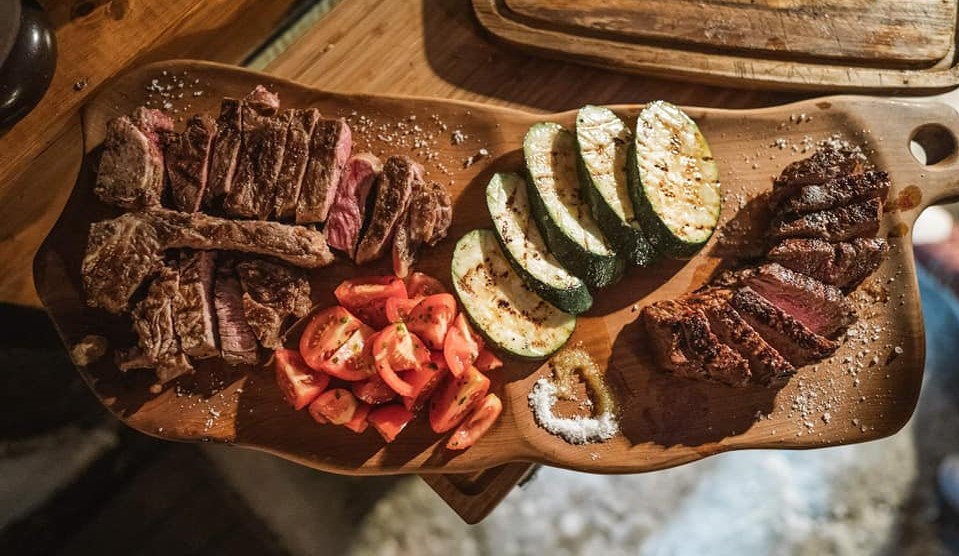
Rešetka and Đurina Hiža are renowned for using only high quality, locally sourced produce within their dishes including, this year, beef from a hybrid of Japan's famed wagyu and Holstein, sourced from the first range herd of its kind in Croatia © Rešetka
With a commitment to cooking only with high quality, locally sourced produce and ingredients, the team is known to use premium meats and seafood for their dishes. This year they will offer beef from a hybrid of Japan's famed wagyu and Holstein, sourced from the first range herd of its kind in Croatia. Within a summer menu that combines the best of continental and coastal Croatian ingredients, you'll also find superior snacks such as rich pork belly paired with octopus.
Nikola Božić is also the proprietor of Đurina Hiža near Varaždinske Toplice. As recently covered in TCN, thanks to some quick and positive thinking, though the restaurant closed for a while in the Coronavirus lockdown, Nikola was able to adapt his business in order to remain successful during the period; relying on high quality, locally sourced ingredients, he became a bridge between the small producers he'd spent time finding, and those shopping online from their homes. Their 'Deda Goes Around the World' service delivered meats and other produce throughout Croatia during the restaurant's temporary closure.
If you're planning to visit Dubrovnik, Biograd, Pula, Premantura or Split this summer and can't face another pizza slice, kebab or burger of questionable origin, be sure to look out for the Rešetka logo. Fine Street Food by Reshetka & Katarina Vrenc will visit Plavica Bar on island Cres on 7 & 8 August and the Michelin-starred Boškinac on Pag in the middle of September. Further inland, they'll also be available at the High Grounds Festival in Varaždinske Toplice on 31 July, 1 & 2 August. Grab yourself a handful of delicious food and pick a spot to watch the stunning Croatian sunset, the Adriatic coast and its breathtaking backdrop has long been lacking exactly this standard of street food to accompany.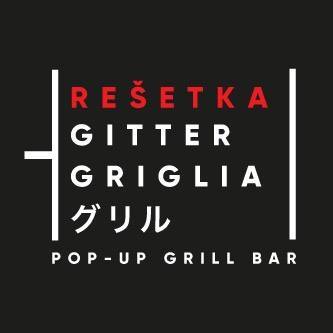
© Rešetka
Kvarner is Ready to Open Borders and Welcome Guests
May 28, 2020 - In May, a total of 39 hotels and 11 campsites were opened in Kvarner, and according to the announcements of the Kvarner Tourist Board, a larger number of accommodation facilities will be opened in June, if the borders continue to be opened and the travel ban lifted.
HRTurizam writes that thanks to the fact that Croatia is at the top of European countries that have kept their epidemiological situation under very good control, and in that way preserved the health image of the country, the planned opening of the borders was started and thus partially enabled the beginning of the summer tourist season.
If we look at the situation within Croatia, the Kvarner region is among the best in the reactions of services that have contributed to the preservation of the epidemiological picture. Our experience, awareness, and centuries-old tradition in health tourism have certainly made a great contribution to the organized implementation of protection measures. Also, by closing their premises and respecting the measures, accommodation and catering facilities have contributed to maintaining a good epidemiological situation and thus are ready for the start of the summer tourist season quicker than others.
"Since the beginning of the pandemic, the Kvarner Tourist Board has maintained constant communication with domestic and foreign tourist journalists, bloggers and agents. Our main message is #VisitKvarnerTomorrow, which we use together with our local tourist communities from the Kvarner area. We are also in contact with the Representations of the Croatian Tourist Board in order to react in a timely manner and to be able to re-realize the study trips of journalists as soon as possible. Every year so far, the Kvarner Tourist Board has organized almost 500 study trips, which have resulted in numerous valuable publications in the strongest tourist media. The great interest of foreign tourism journalists comes to us through the platform TravMedia.com, the world's largest press network for the tourism sector, where through our regular publications we maintain contacts with journalists, "influencers", media professionals, PR agencies and other representatives of the tourism industry," pointed out the director of the Kvarner Tourist Board, Irena Peršić Živadinov, and added that it is important to agree at the EU level as soon as possible on a unified procedure for the arrival of guests and their return to their home countries.
At the moment, one of the strongest advantages of Croatia is the proximity and the fact that we are a very quick auto-destination. The Kvarner region, primarily for guests from Slovenia, Austria and Hungary, is first on the list as a destination for a short weekend getaway, considering that a large number of residents of those countries were forced to use their holidays while the pandemic was at its peak.
"This possibility of unhindered and fast border crossing, as well as the conditions for returning to the home country, will greatly affect the final results of the summer tourist season. According to the expectations of the tourist economy," Peršić Živadinov points out.
This season, Kvarner expects 30% of last year's tourist traffic in the summer months
According to information from the field and partners from our main foreign markets, reservations for the main season have not been canceled, and interest and intentions for guests to come to Kvarner during the summer still stand, explains Peršić Živadinov, and adds that this year, they could realize about 30% of last year's tourist traffic in the summer months.
Although Kvarner started the 2020 tourist year with excellent numbers - during January and February there were 16% more overnight stays and 16% more arrivals, and many years of statistical analysis confirmed steady and stable growth, due to the pandemic and closed borders, everything is temporary on hold. With the relaxation of measures in the first 10 days of May, 14,000 overnight stays were realized, while in the next 10 days, 43,000 new overnight stays were realized.
Slovenes are the first guests
For example, since the opening of the borders with Slovenia, the Kvarner region has recorded a gradual increase in the number of guests. Thus, on the first weekend after the measures were relaxed, guests from Slovenia realized 1,550 overnight stays (which is 22% of the realization if we compare with the same weekend in 2019). Already next weekend (22.05.-24.05.2020) guests from Slovenia realized 9,150 overnight stays (which is 58% of the realization if we compare with the same weekend in 2019)
"It is important for us to relax measures and decisions on the relaxation of border crossing conditions from Austria and Germany, given that guests from Austria have a share of 15%, and guests from Germany a share of as much as 30% in all total overnight stays in Kvarner. In this sense, the results of a survey conducted in Germany, which showed that Croatia still remains at the top of the most sought-after destinations, are positive, and it is expected that this year German guests will achieve the smallest drop in arrivals, 20%, compared to the other three Mediterranean countries (Italy, Greece and Turkey)," concluded Peršić Živadinov.
To read more about travel in Croatia, follow TCN's dedicated page.
European Capital of Culture Title Brings Record Rijeka Tourism
Rijeka tourism is booming, and this often overlooked Croatian city, known for its industrial past and perhaps what's most interesting of all, the invention of the torpedo, is experiencing a great start to 2020.
Rijeka isn't always that high on the lists of foreign tourists keen to explore Croatia. With central and southern Dalmatian cities like Split and Dubrovnik always firmly placed, sometimes even Zagreb doesn't get a look in. Things appear to be changing, however, now that the city that flows in the Northern Adriatic area of the country has taken the European Capital of Culture Title for 2020.
As Novac writes on the 6th of March, 2020, in February 2020, Rijeka ranked impressively in third place in terms of tourist turnover earned in family accommodation units with 2,650 realised arrivals, and ranked eighth in total tourist turnover in the Republic of Croatia with 20,037 overnight stays achieved.
Novi list reported on the above announcement issued by the Rijeka Tourist Board, who also noted the first two months of 2020, Rijeka tourism was doing more than brilliantly as the city recorded an excellent tourist turnover of 37,943 overnight stays, which marks impressive growth of thirteen percent when compared to the same period in 2019.
The highest number of overnight stays in Rijeka was realised by Italian citizens, and then tourists from the USA, who realised 2,765 overnight stays, which is of significant interest. The average stay of foreign tourists in the period between the 1st of January 2020 to the 2nd of February 2020 is 3.48 days and the average stay of Croatian tourists is 2.21 days.
The excellent Rijeka tourism result is supported by the tourist turnover for February, which recorded 20,052 overnight stays, which is fourteen percent more than back in February 2019, long before Rijeka took the title of European Capital of Culture.
The rich programme of the Rijeka Carnival certainly also contributed heavily to the largest number of overnight stays recorded in February in the City of Rijeka.
Last month, the European Capital of Culture shined adorned its vibrant carnival colours and generated tourist turnover of 4,358 overnight stays, seventeen percent more than were realised back in 2019 during the Rijeka Carnival weekend, which ran from February the 21st to the 24th, 2020.
Guests and participants of the International Carnival Parade contributed to the increase of tourist traffic not only in Rijeka, but also in all nearby destinations in the Kvarner region.
According to data from the eVisitor information system, the largest number of overnight stays in February were spent in private accommodation, which accounts for 45.27 percent, followed by hotels, non-commercial accommodation and hostels.
Make sure to follow our dedicated travel page for more.
Croatia Kvarner Region Tourist Traffic Up 50 Percent in 10 Years
Kvarner's tourist traffic numbers continue their upward trajectory. The Kvarner region, located in Northwestern Croatia, finished 2019 with 3.1 million arrivals and 19.1 million overnight stays. Compared to 2018, there were 2% more arrivals and 1% more overnights. Overnights also increased by 3% compared to 2017, 13% compared to 2016 and 50% compared to 2010.
During peak season, overnight stays remained at last year's levels, with an average occupancy of 25 days, and 30 days at hotels. That means that there wasn't a lot of room for growth during the the busiest season of the year, according to MorskiHR on January 8, 2020. Therefore, it is important to emphasize that overnight more stays increased by 1% during pre-season, while the post-season overnight stays increased by 4%. The increase in overnights during pre and post-season is more significant when compared with results from 2010, and it shows that overnights during these times of the year increased by 90%, according to the tourist board.
Germany Traditionally Strongest Market
In 2019, 630,000 German guests visited the Kvarner region, resulting in almost 4.7 million overnight stays. This figure has certainly been influenced by the large number of promotions directed toward the German market. In addition to Germany, three more markets have reached more than one million overnights: Slovenia (3 million), Austria (1.8 million) and Italy (1.3 million). The share of foreign traffic for these four countries is nearly 70%.
Kvarner’s inclusion on group tour routes which take guests from distant markets to Europe has also resulted in a large increase in traffic from these markets. In the last 3 years, guests from China have almost tripled their number of overnight stays while US citizens have increased their overnights by 50%.
Guests from the United Kingdom are also worth mentioning. They spent 137,000 overnights in Kvarner which is 25% increase from 2018, and 44% increase from 2016! Foreign tourists account for 85% of overnight stays and domestic tourists 15% (3 million nights, an increase of 5%).
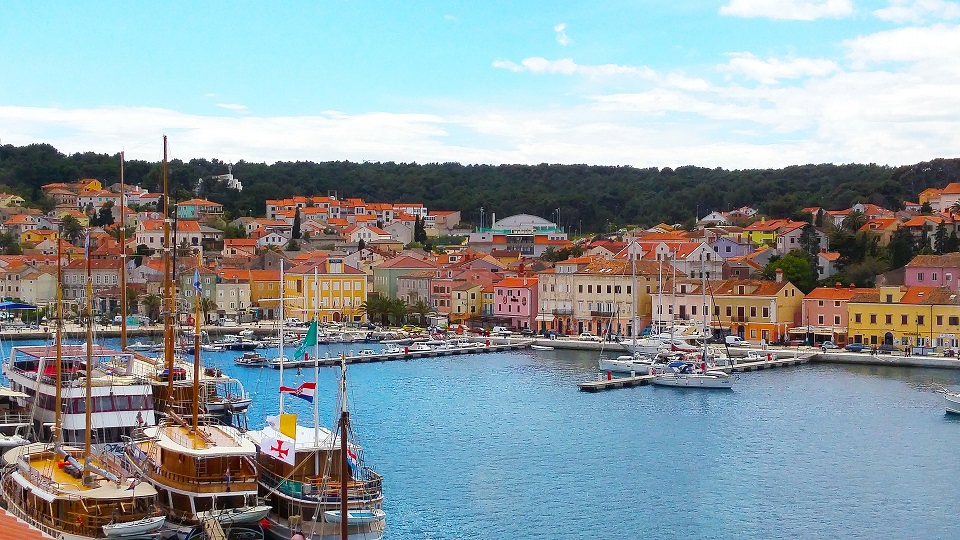
Mali Lošinj
Most Guest Overnights on Island of Krk
Among the subregions, the island of Krk is in the lead, with an increase of 1% and 7 million overnights (and has a 36% share of total overnights in Kvarner).
The Crikvenica-Vinodol Riviera ranks second (3.2 million) followed by the island of Losinj (2.4 million). The number of overnight stays continues as follows: the Opatija Riviera and the island of Rab (2.2 million), the island of Cres (1.1 million), the Rijeka area (925,000) and Gorski Kotar (110,000). The highest percentage increase in overnight stays (14%) was recorded in the Rijeka area.
Mali Losinj (2.4 million nights) and Crikvenica (2.2 million nights) are among the "best" destinations.
Guests Prefer Croatia Family Accommodations
Family accommodations accounted for 40% of recorded overnight stays (7.7 million). Campsites and hotels recorded almost the same number of total overnights: 3.7 million each with individual shares of 19%.
The highest increase in overnights was recorded in upper-category accommodations:
- Hotels generally realized 1% more overnights. However, 4 and 5-star hotels enjoyed a 6% increase.
- All family accommodations experienced a 1% increase in overnight stays, but 5-star family accommodations enjoyed a 38% increase!
- A similar scenario applies to campsites: there was an overall 1% decrease in overnight stays, but overnights at 5-star camps are up 22%.
Regardless of the type, 5-star facilities have seen 15% increase in overnight stays during the past year and 70% increase overnight over the last 3 years!
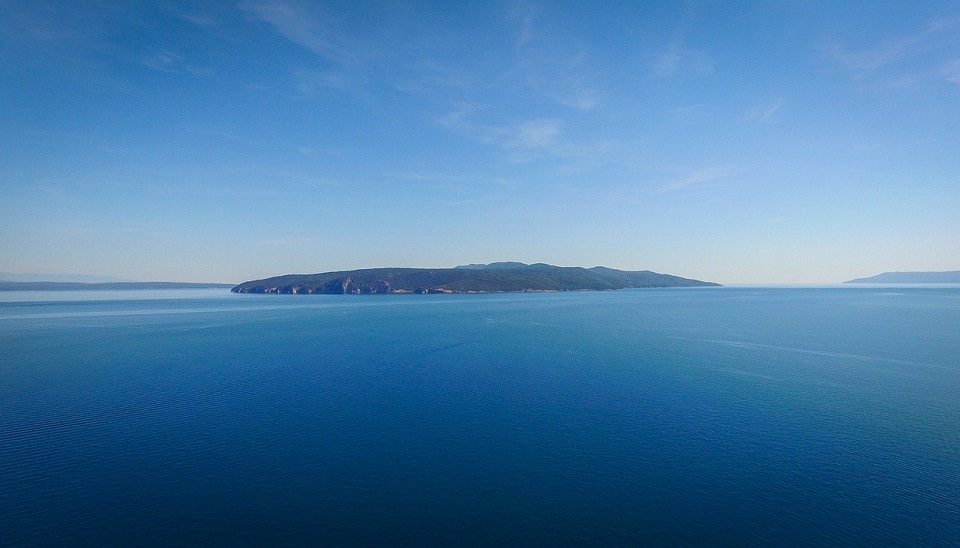
Cres
Nautical Tourism Overnights Up Thirty-Two Percent
These figures do not include 24,500 arrivals and 156,000 overnight stays due to nautical traffic, which in has increased by as much as 32% the last year alone. There are about 20 nautical tourism ports in Kvarner, and Marina Punat alone accounts for more than half of nautical overnights.
Kvarner Third to Istria and Split-Dalmatia in Accommodation Capacity
As of 2019, there are 190,000 permanent beds available for tourists in Kvarner which represent a 17% share in accommodation capacity within Croatia. The Kvarner region ranks third in terms of total available accommodation, which is behind Istria and Split-Dalmatia counties in Croatia.
Irena Peršić Živadinov, Director of the Kvarner Tourist Board, emphasizes that the primary goal is to strengthen the pre and post-seasons, because one cannot always count on a record “peak” season.
Kvarner Tourist Board Expects Long-Term Increase
“In recent years, the Kvarner region has definitely succeeded in strengthening the pre and post-seasons. Compared 2010 to 2019, we have seen a huge increase in overnight stays during both seasons - almost 90%! Over the past 10 years, we have invested in the quantity and quality of the regions’ offerings. We have also focused on joint branding and activities and recognized our strengths regarding products and offerings."
“These steps probably won’t yield immediate results but will take a longer time to have an effect. Taking that into consideration, for example, 12.7 million overnight stays were recorded in 2010, it is clear that in a period of 9 years we have realized 6.3 million more overnights, or the total number of overnights in Kvarner ha increased by almost 50%,” Peršić Živadinov points out.
Follow our Travel page to keep up-to-date on tourism trends in Croatia.


